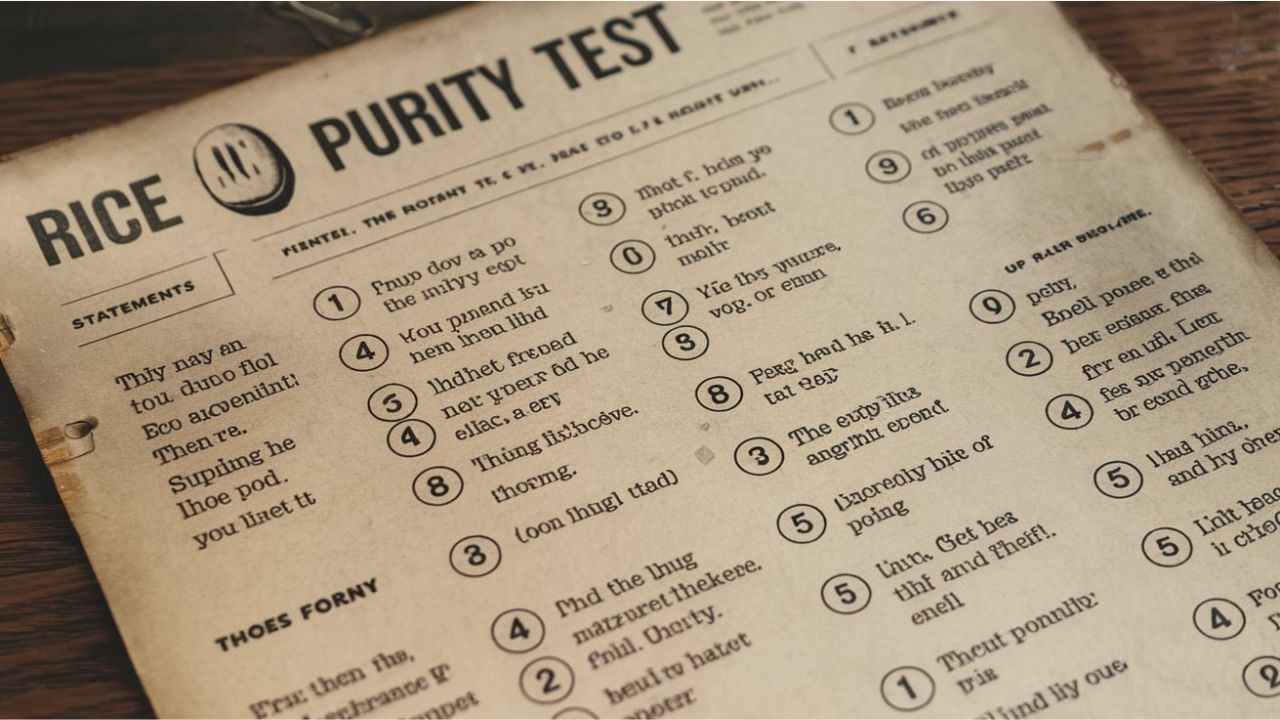For anyone who has spent time browsing college or youth culture forums, the RicePurity Test might sound familiar. Originally developed as a fun survey to gauge personal experiences, this test has become a viral phenomenon, popular among teens and young adults who want to reflect on or compare their life experiences. Let’s dive into the background, purpose, and the intrigue surrounding the Rice Purity Test and understand why it remains so popular in today’s digital age.
What is the Rice Purity Test?
The Rice Purity Test is a self-assessment survey designed to measure a person’s level of “innocence” or “experience” through a series of questions about life events, from tame to wild. The test includes 100 questions, each answered with “yes” or “no,” with questions covering topics like relationships, drinking, and more adventurous activities. Initially designed by Rice University students, the Rice Purity Test was a fun way to bond and compare experiences.
Purpose of the Rice Purity Test: It was originally intended as a “purity” questionnaire for college students to reflect on the extent of their social and personal experiences. Today, it’s more of a social tool and doesn’t necessarily carry the judgmental tone that the word “purity” might imply.
Why Do People Take the Rice Purity Test?
The Rice Purity Test serves several purposes in today’s digital age, particularly among students and young adults:
- Self-Reflection and Fun
Taking the Rice Purity Test can offer a sense of personal reflection. Young adults might see it as a way to consider where they stand in terms of experiences compared to their friends. - Peer Comparison
Many people take the test to compare scores with their friends, classmates, or online acquaintances. It’s a way to break the ice or even bond over shared experiences. - Cultural Trend and Online Popularity
With the test’s popularity spreading across social media, more people are curious to see their own scores and how they compare to others. On platforms like TikTok, YouTube, and Reddit, users post their scores as part of the “Rice Purity Test challenge.” - A Way to Destigmatize Conversations
For some, the Rice Purity Test serves as a way to talk about topics that are often sensitive or stigmatized. By framing it as a quiz, the test allows people to discuss personal topics more openly and with a bit of humor.
Understanding the Scoring of the Rice Purity Test
The Rice Purity Test is scored from 0 to 100, with 100 being the “purest” score, indicating fewer life experiences, and 0 reflecting a life rich with various (sometimes wild) experiences. Here’s a breakdown:
- High Scores (70-100): Often seen as “pure” or “innocent,” these scores suggest that a person has fewer adventurous experiences.
- Mid-Range Scores (40-70): Indicate a mix of experiences; people in this range may have tried new things but not reached extreme ends.
- Low Scores (0-40): Reflect individuals who have experienced a wide range of life events, often the more adventurous or wild side.
A Look at Some Rice Purity Test Questions
The questions in the Rice Purity Test range from innocent experiences to more risqué ones. Here are some examples:
- Mild questions:
- “Held hands romantically?”
- “Danced without leaving room for Jesus?”
- Moderate questions:
- “Gone on a date?”
- “Been intoxicated?”
- Riskier questions:
- “Used a drug stronger than marijuana?”
- “Had the police called on you?”
Each question answered with “yes” lowers your overall purity score, while “no” maintains it. This makes the test highly adaptable to different individuals’ comfort zones, as there’s no obligation to answer in a specific way.
History of the RicePurity Test: From Rice University to Viral Fame
The Rice Purity Test was originally created in the 1920s at Rice University as a bonding exercise among new students. The goal was to help freshmen bond by comparing their backgrounds and experiences, making the transition to college life easier. It became a fun and lighthearted tool, helping students to connect and find common ground. Over the decades, the test spread beyond Rice University, eventually finding a home online. Today, it has evolved, attracting audiences far beyond college campuses.
Why the Rice Purity Test is Popular in the Digital Age
The popularity of the Rice Purity Test surged with the rise of social media. On platforms like TikTok and Instagram, users openly discuss their scores and encourage others to take the test. Reasons behind its continued popularity include:
- Relatable and Accessible Content
The test is straightforward, relatable, and engaging. The questions cover universally recognizable experiences, making it a quick, accessible way for people to reflect on life experiences. - Challenge Culture on Social Media
Social media loves a good challenge, and the Rice Purity Test fits right in. People post their scores, daring friends to beat them or commenting on the experiences that led to specific scores. - A Safe Way to Discuss Experiences
The quiz format offers a non-threatening way to discuss personal experiences that might otherwise be sensitive. With a test-based structure, people are able to talk about diverse life experiences without judgment. - A Sense of Belonging and Connection
For college students, taking the Rice Purity Test can bring a sense of shared identity. It provides a way to gauge where they stand compared to others and opens the door to relatable, often humorous conversations.
Is the Rice Purity Test Accurate or Just for Fun?
While the RicePurity Test can be an entertaining tool, it isn’t scientific and shouldn’t be taken too seriously. It’s a lighthearted way to reflect on experiences, but the score is subjective and only offers a general snapshot of life experiences. It’s most valuable as a conversation starter or a fun bonding activity, rather than a definitive measure of one’s character or lifestyle.
Is There a Right or Wrong Rice Purity Score?
The Rice Purity Test is meant to be enjoyed without judgment. There’s no “correct” score—it’s all relative to personal experiences and comfort zones. Some people might score high, indicating they’ve led a more sheltered or cautious life, while others score low, often reflecting a broader range of experiences. Ultimately, it’s about self-awareness and enjoying the lighthearted nature of the test.
FAQs
What is the Rice Purity Test?
The Rice Purity Test is a 100-question survey that allows individuals to assess their life experiences, from innocent to more adventurous activities, originally created as a bonding tool at Rice University.
Why do people take the Rice Purity Test?
People take the Rice Purity Test for fun, self-reflection, or as part of social media challenges, often sharing scores to compare experiences and connect with others.
How is the Rice Purity Test scored?
The test is scored from 0 to 100, with a higher score indicating fewer experiences and a lower score indicating more life events. Each “yes” answer lowers the final score.
Is there a best score on the Rice Purity Test?
There is no “best” score. The test is designed as a personal reflection tool rather than a judgmental measure. Each score represents a unique set of experiences.
How did the Rice Purity Test start?
The test originated at Rice University in the 1920s as a way for students to bond over shared or contrasting experiences. Today, it’s a popular online quiz among young adults.
Can you take the RicePurity Test multiple times?
Yes, people often take the test multiple times over the years to see how their score changes with new experiences.
Conclusion
The RicePurity Test remains a fun, insightful tool for personal reflection and social connection. While its questions might feel lighthearted or silly, the test taps into a universal curiosity about how our life experiences shape us. In a world where everyone’s journey is different, the Rice Purity Test offers a unique way to share and celebrate the diverse paths we take, making it a lasting and meaningful part of youth culture. Whether you take it for fun or self-awareness, the Rice Purity Test is a reminder that every life story is worth exploring.











